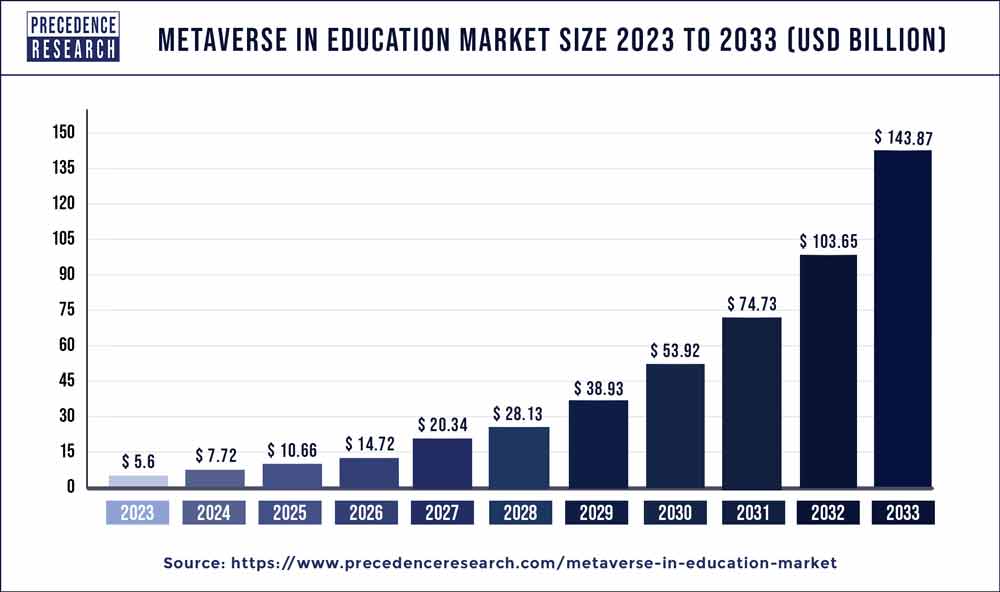The metaverse in education market size is poised to grow by USD 143.87 billion by 2033 from USD 5.6 billion in 2023, exhibiting a CAGR of 38.40% during the forecast period 2024 to 2033.
Key Takeaways
- North America contributed more than 36% market share in 2023.
- The Asia-Pacific region is estimated to expand the fastest CAGR between 2024 and 2033.
- By component, the hardware segment has held the largest market share of 62% in 2023.
- By component, the service segment is anticipated to grow at a remarkable CAGR of 39.14% between 2024 and 2033.
- By application, the educational apps segment generated over 26% market share in 2023.
- By application, the learning segment is expected to expand at the fastest CAGR over the projected period.

The integration of the metaverse into the education sector marks a transformative shift in the traditional learning landscape. The metaverse, a virtual and immersive space, brings a novel dimension to education by fostering engaging and interactive learning experiences. It combines elements of augmented reality (AR), virtual reality (VR), and other digital technologies to create a dynamic educational environment.
Get a Sample Report: https://www.precedenceresearch.com/sample/3691
Growth Factors
The growth of the metaverse in education is fueled by various factors. Firstly, it enhances student engagement through immersive simulations and interactive content, making learning more enjoyable and effective. Additionally, the global adoption of advanced technologies and increased internet connectivity has facilitated the widespread implementation of metaverse-based educational platforms. The ability to transcend geographical boundaries and provide inclusive learning experiences further contributes to the rapid growth of this market.
Metaverse in Education Market Scope
| Report Coverage | Details |
| Growth Rate from 2024 to 2033 | CAGR of 38.40% |
| Global Market Size in 2023 | USD 5.6 Billion |
| Global Market Size by 2033 | USD 143.87 Billion |
| U.S. Market Size in 2023 | USD 1.41 Billion |
| U.S. Market Size by 2033 | USD 36.52 Billion |
| Base Year | 2023 |
| Forecast Period | 2024 to 2033 |
| Segments Covered | By Component and By Application |
| Regions Covered | North America, Europe, Asia-Pacific, Latin America, and Middle East & Africa |
Read More: Alpha Emitter Market Size to Worth USD 1,488.02 Million By 2033
Opportunities
Numerous opportunities abound in the metaverse in education market. Institutions can leverage this technology to offer personalized learning experiences tailored to individual student needs. Collaboration and communication within virtual spaces open up new possibilities for global classrooms and cross-cultural exchanges. Furthermore, the development of educational content and applications within the metaverse presents opportunities for content creators and developers to contribute to this evolving ecosystem.
Challenges
Despite the promising prospects, challenges exist in the metaverse in education market. Concerns related to data privacy and security in virtual environments require robust solutions to ensure the protection of sensitive information. Access and affordability also pose challenges, as not all students may have equal access to the required technology. Additionally, the learning curve for educators and students adapting to the metaverse can be a hurdle, necessitating comprehensive training programs to ensure effective utilization.
Metaverse in Education Market Companies
- Microsoft
- Facebook (Meta)
- Unity Technologies
- NVIDIA Corporation
- HTC Corporation
- Sony Corporation
- Oculus VR (acquired by Meta)
- Samsung Electronics
- Lenovo Group
- Alphabet Inc.
- Apple Inc.
- Magic Leap
- Qualcomm Technologies
- PTC Inc.
Data Sources and Methodology
To gather comprehensive insights on the Global Metaverse in education Market, we relied on a range of data sources and followed a well-defined methodology. Our approach involved interactions with industry experts and key stakeholders across the market’s value chain, including management organizations, processing organizations, and analytics service providers.
We followed a rigorous data analysis process to ensure the quality and credibility of our research. The gathered information was carefully evaluated, and relevant quantitative data was subjected to statistical analysis. By employing robust analytical techniques, we were able to derive meaningful insights and present a comprehensive overview of the Global Metaverse in education Market.
The most resonating, simple, genuine, and important causes because of which you must decide to buy the Metaverse in education market report exclusively from precedence research
- The research report has been meticulously crafted to provide comprehensive knowledge on essential marketing strategies and a holistic understanding of crucial marketing plans spanning the forecasted period from 2023 to 2032.
Key Features of the Report:
- Comprehensive Coverage: The report extensively encompasses a detailed explanation of highly effective analytical marketing methods applicable to companies across all industry sectors.
- Decision-Making Enhancement: It outlines a concise overview of the decision-making process while highlighting key techniques to enhance it, ensuring favorable business outcomes in the future.
- Articulated R&D Approach: The report presents a well-defined approach to conducting research and development (R&D) activities, enabling accurate data acquisition on current and future marketing conditions.
Market Segmentation:
By Component
- Hardware
- Services
By Application
- Learning, Skill Development
- Educational Apps
- Self-Regulation Skills
- Cultural Understanding
By Geography
- North America
- Europe
- Asia-Pacific
- Latin America
- Middle East and Africa
Reasons to Consider Purchasing the Report:
- Enhance your market research capabilities by accessing this comprehensive and precise report on the global Metaverse in education market.
- Gain a thorough understanding of the overall market landscape and be prepared to overcome challenges while ensuring robust growth.
- Benefit from in-depth research and analysis of the latest trends shaping the global Metaverse in education market.
- Obtain detailed insights into evolving market trends, current and future technologies, and strategic approaches employed by key players in the global Metaverse in education market.
- Receive valuable recommendations and guidance for both new entrants and established players seeking further market expansion.
- Discover not only the cutting-edge technological advancements in the global Metaverse in education market but also the strategic plans of industry leaders.
Table of Content
Chapter 1. Introduction
1.1. Research Objective
1.2. Scope of the Study
1.3. Definition
Chapter 2. Research Methodology (Premium Insights)
2.1. Research Approach
2.2. Data Sources
2.3. Assumptions & Limitations
Chapter 3. Executive Summary
3.1. Market Snapshot
Chapter 4. Market Variables and Scope
4.1. Introduction
4.2. Market Classification and Scope
4.3. Industry Value Chain Analysis
4.3.1. Raw Material Procurement Analysis
4.3.2. Sales and Distribution Channel Analysis
4.3.3. Downstream Buyer Analysis
Chapter 5. COVID 19 Impact on Metaverse in Education Market
5.1. COVID-19 Landscape: Metaverse in Education Industry Impact
5.2. COVID 19 – Impact Assessment for the Industry
5.3. COVID 19 Impact: Global Major Government Policy
5.4. Market Trends and Opportunities in the COVID-19 Landscape
Chapter 6. Market Dynamics Analysis and Trends
6.1. Market Dynamics
6.1.1. Market Drivers
6.1.2. Market Restraints
6.1.3. Market Opportunities
6.2. Porter’s Five Forces Analysis
6.2.1. Bargaining power of suppliers
6.2.2. Bargaining power of buyers
6.2.3. Threat of substitute
6.2.4. Threat of new entrants
6.2.5. Degree of competition
Chapter 7. Competitive Landscape
7.1.1. Company Market Share/Positioning Analysis
7.1.2. Key Strategies Adopted by Players
7.1.3. Vendor Landscape
7.1.3.1. List of Suppliers
7.1.3.2. List of Buyers
Chapter 8. Global Metaverse in Education Market, By Component
8.1. Metaverse in Education Market, by Component, 2024-2033
8.1.1. Hardware
8.1.1.1. Market Revenue and Forecast (2021-2033)
8.1.2. Services
8.1.2.1. Market Revenue and Forecast (2021-2033)
Chapter 9. Global Metaverse in Education Market, By Application
9.1. Metaverse in Education Market, by Application, 2024-2033
9.1.1. Learning, Skill Development
9.1.1.1. Market Revenue and Forecast (2021-2033)
9.1.2. Educational Apps
9.1.2.1. Market Revenue and Forecast (2021-2033)
9.1.3. Self-Regulation Skills
9.1.3.1. Market Revenue and Forecast (2021-2033)
9.1.4. Cultural Understanding
9.1.4.1. Market Revenue and Forecast (2021-2033)
Chapter 10. Global Metaverse in Education Market, Regional Estimates and Trend Forecast
10.1. North America
10.1.1. Market Revenue and Forecast, by Component (2021-2033)
10.1.2. Market Revenue and Forecast, by Application (2021-2033)
10.1.3. U.S.
10.1.3.1. Market Revenue and Forecast, by Component (2021-2033)
10.1.3.2. Market Revenue and Forecast, by Application (2021-2033)
10.1.4. Rest of North America
10.1.4.1. Market Revenue and Forecast, by Component (2021-2033)
10.1.4.2. Market Revenue and Forecast, by Application (2021-2033)
10.2. Europe
10.2.1. Market Revenue and Forecast, by Component (2021-2033)
10.2.2. Market Revenue and Forecast, by Application (2021-2033)
10.2.3. UK
10.2.3.1. Market Revenue and Forecast, by Component (2021-2033)
10.2.3.2. Market Revenue and Forecast, by Application (2021-2033)
10.2.4. Germany
10.2.4.1. Market Revenue and Forecast, by Component (2021-2033)
10.2.4.2. Market Revenue and Forecast, by Application (2021-2033)
10.2.5. France
10.2.5.1. Market Revenue and Forecast, by Component (2021-2033)
10.2.5.2. Market Revenue and Forecast, by Application (2021-2033)
10.2.6. Rest of Europe
10.2.6.1. Market Revenue and Forecast, by Component (2021-2033)
10.2.6.2. Market Revenue and Forecast, by Application (2021-2033)
10.3. APAC
10.3.1. Market Revenue and Forecast, by Component (2021-2033)
10.3.2. Market Revenue and Forecast, by Application (2021-2033)
10.3.3. India
10.3.3.1. Market Revenue and Forecast, by Component (2021-2033)
10.3.3.2. Market Revenue and Forecast, by Application (2021-2033)
10.3.4. China
10.3.4.1. Market Revenue and Forecast, by Component (2021-2033)
10.3.4.2. Market Revenue and Forecast, by Application (2021-2033)
10.3.5. Japan
10.3.5.1. Market Revenue and Forecast, by Component (2021-2033)
10.3.5.2. Market Revenue and Forecast, by Application (2021-2033)
10.3.6. Rest of APAC
10.3.6.1. Market Revenue and Forecast, by Component (2021-2033)
10.3.6.2. Market Revenue and Forecast, by Application (2021-2033)
10.4. MEA
10.4.1. Market Revenue and Forecast, by Component (2021-2033)
10.4.2. Market Revenue and Forecast, by Application (2021-2033)
10.4.3. GCC
10.4.3.1. Market Revenue and Forecast, by Component (2021-2033)
10.4.3.2. Market Revenue and Forecast, by Application (2021-2033)
10.4.4. North Africa
10.4.4.1. Market Revenue and Forecast, by Component (2021-2033)
10.4.4.2. Market Revenue and Forecast, by Application (2021-2033)
10.4.5. South Africa
10.4.5.1. Market Revenue and Forecast, by Component (2021-2033)
10.4.5.2. Market Revenue and Forecast, by Application (2021-2033)
10.4.6. Rest of MEA
10.4.6.1. Market Revenue and Forecast, by Component (2021-2033)
10.4.6.2. Market Revenue and Forecast, by Application (2021-2033)
10.5. Latin America
10.5.1. Market Revenue and Forecast, by Component (2021-2033)
10.5.2. Market Revenue and Forecast, by Application (2021-2033)
10.5.3. Brazil
10.5.3.1. Market Revenue and Forecast, by Component (2021-2033)
10.5.3.2. Market Revenue and Forecast, by Application (2021-2033)
10.5.4. Rest of LATAM
10.5.4.1. Market Revenue and Forecast, by Component (2021-2033)
10.5.4.2. Market Revenue and Forecast, by Application (2021-2033)
Chapter 11. Company Profiles
11.1. Microsoft
11.1.1. Company Overview
11.1.2. Product Offerings
11.1.3. Financial Performance
11.1.4. Recent Initiatives
11.2. Facebook (Meta)
11.2.1. Company Overview
11.2.2. Product Offerings
11.2.3. Financial Performance
11.2.4. Recent Initiatives
11.3. Google
11.3.1. Company Overview
11.3.2. Product Offerings
11.3.3. Financial Performance
11.3.4. Recent Initiatives
11.4. Unity Technologies
11.4.1. Company Overview
11.4.2. Product Offerings
11.4.3. Financial Performance
11.4.4. Recent Initiatives
11.5. NVIDIA Corporation
11.5.1. Company Overview
11.5.2. Product Offerings
11.5.3. Financial Performance
11.5.4. Recent Initiatives
11.6. HTC Corporation
11.6.1. Company Overview
11.6.2. Product Offerings
11.6.3. Financial Performance
11.6.4. Recent Initiatives
11.7. Sony Corporation
11.7.1. Company Overview
11.7.2. Product Offerings
11.7.3. Financial Performance
11.7.4. Recent Initiatives
11.8. Oculus VR (acquired by Meta)
11.8.1. Company Overview
11.8.2. Product Offerings
11.8.3. Financial Performance
11.8.4. Recent Initiatives
11.9. Samsung Electronics
11.9.1. Company Overview
11.9.2. Product Offerings
11.9.3. Financial Performance
11.9.4. Recent Initiatives
11.10. Lenovo Group
11.10.1. Company Overview
11.10.2. Product Offerings
11.10.3. Financial Performance
11.10.4. Recent Initiatives
Chapter 12. Research Methodology
12.1. Primary Research
12.2. Secondary Research
12.3. Assumptions
Chapter 13. Appendix
13.1. About Us
13.2. Glossary of Terms
Unlocking Market Insights through Data Excellence
The “Precedence Statistics” flexible dashboard is a powerful tool that offers real-time news updates, economic and market forecasts, and customizable reports. It can be configured to support a wide range of analysis styles and strategic planning needs. This tool empowers users to stay informed and make data-driven decisions in various scenarios, making it a valuable asset for businesses and professionals looking to stay ahead in today’s dynamic and data-driven world.
Access our Premium Real Time Data Intelligence Tool, Visit: www.precedencestatistics.com
Precedence Statistics – Empowering Your Data Insights
Contact Us
Precedence Research
Apt 1408 1785 Riverside Drive Ottawa, ON, K1G 3T7, Canada
Call: +1 9197 992 333
Email: sales@precedenceresearch.com
